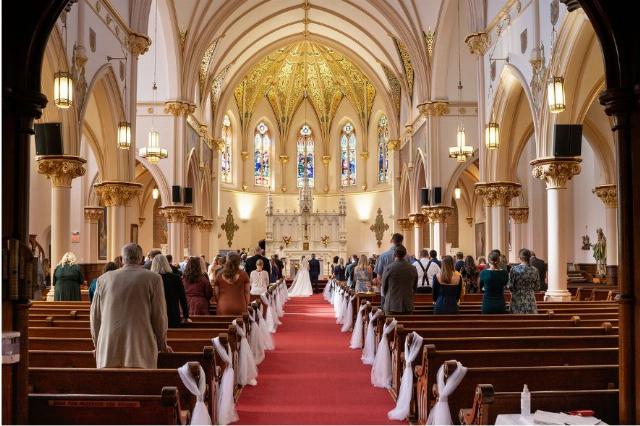Not the Church I Left
As I’ve written before, the church of my baptism was where you, Creator, heritage, past, present, and future merged and focused. This remains the image and fact of my relation with the church. During my childhood it was appropriately beautiful in every detail, as one would expect the home of a divine King. Bone-stirring pipe organ tones made me hear other-worldly music. A trained choir sang music inspired by heaven.
That was in the Brooklyn, New York of the 1930s and 1940s, before my teen years and young adulthood turned me into a skeptic and non-practicing Catholic. I had passed through that well-known phase that makes some youngsters believe that they actually know more than all who came before them.
I left the church, not because of a loss of love for it, but because of a weakness in me to fully comprehend it. In my search to find the “right” relationship with God I walked through competing philosophies, religions, and isms to discover the “right” one. And I noticed that each required a tacit leap of faith in order to accept and abide in its “givens” — the “the rules of the game,” as it were. And I noticed that not one of them made a difference that matters most to the human heart and spirit than Judeo-Christianity, bestowed to us by Jesus Christ through his disciples. That Christ chose Peter to proclaim, guard, and maintain the faith in the church he founded is an undismissible fact. In spite of its human failings, the Catholic church held that sacred post for two thousand years.
The need of returning to the fold was not possible for me to ignore. That Catholicism was the religion of many with higher IQs than mine became a “fact check” that emphasized the role of the brain in such important matters. All this was considered when I accepted an offer in the 1970s to be church organist at a Catholic church in New England. I had two good reasons to take the assignment. One, I’d be playing better music (what I expected) than I had in the non-Catholic churches that hired me for their music; two, it would ease my reorientation to the church of my original loyalty. This was my conviction before I sat at the organ in the choir loft for the first time.
It was to be a vast disappointment. It was evident since the Second Vatican Council (1962–65) that this was not the church I left. The altar was gone, replaced by a table with the priest facing the congregation instead of God. The tabernacle was moved to the side and its former central position in church was taken by a chair for the priest. There was no mistaking the switch of priorities. The sacred liturgy was changed to reflect the spirit of the Novus Ordo (the New Order) instituted by Vatican II. And all things within the church were altered to conform to that spirit.
Catholics in full possession of their senses and still able to think clearly knew that the Novus Ordo was blurring, not clarifying the function and mission of the Catholic church in modern times. Many faithful Catholics left the church to seek spiritual guidance and inspiration elsewhere. To me and many others, Vatican II was not an “updating” of the church but a virtual coup against it. Novus Ordo was responding to what was agreeable to “the times,” dismissing 2,000 years of church history and the sacred deposit of faith from Jesus Christ.
The progress of the church remains in limbo because the question “progress toward what?” has not been dealt with the level of seriousness it requires. What sort of progress makes opinions equal to truth? What sort makes disagreement with the Gospel an option for the church? Or makes right wrong and wrong right a legitimate action for Christians? Is it real progress to strip the church of the beauty of its architectural heritage, art and music? Is it progress to allow the mockery (lately) of what is sacred? Is progress Giving to Caesar what is God’s? (Mark 12:17).
Well, I would patiently await a return to sanity. This was after all where I should be. And my love of music gave me the reason to hang on, even when I was called to play songs with lyrics that were hardly more than greeting-card sentiments, set to soft Rock. I’d do my best, exercising the authority I retained in the selection of music. I was blessed with cooperative and friendly choir members.
Fast-forward to 2013 with the arrival of Pope Francis. Before him, a new papacy would not be extraordinary news. This time however the mainstream media reacted with unprecedented acclaim and enthusiasm, something I had never witnessed in all the years since Pope Pius XII, whom I remembered as a child. Why the accolades from the media, the cheering of celebrities with this pope? In my view, a pope this popular with so many public figures was probably lacking in the leadership required for spiritual matters.
My “simplistic” assessment of Pope Francis was validated by a legacy of division, confusion, and his reproving of faithful Catholics, including fellow bishops, who follow Gospel truth that he considered “backward” and detrimental to “progress.” This was a pope who supported New World Order globalism and political and social agendas in conflict with the Word of God. His disregard for the warnings of past popes on the evils of modernism made Pope Francis indeed a “woke” pope, as the media had identified him. His legacy of world-wide confusion and disarray in the church that Christ established now faces the new pope. May God help Pope Leo XIV restore an overdue measure of sanity and sanctity to a wounded church.

Image: Free image, Pixabay license.